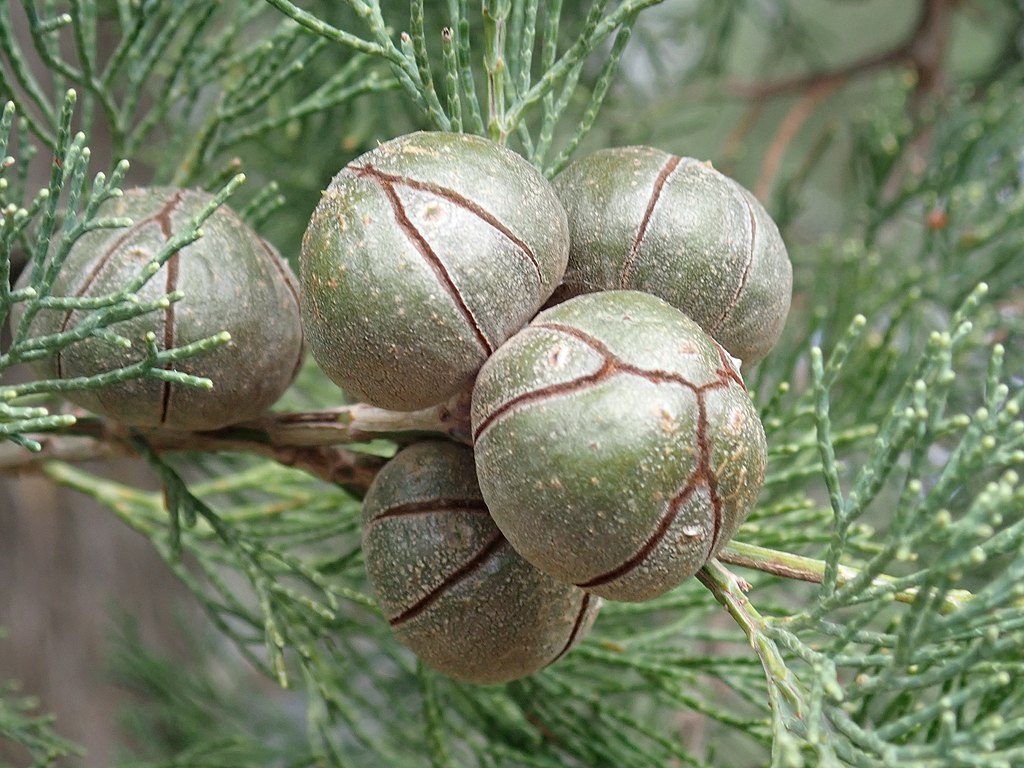Callitris columellaris

|
|
Callitris columellaris Common Names: White cypress-pine, Murray River
cypress-pine, Bribie Island pine, Northern cypress-pine, Inland cypress-pine Scientific
Classification Kingdom: Plantae Clade: Tracheophytes Division: Pinophyta Class: Pinopsida Order: Pinales Family: Cupressaceae Genus: Callitris Species: C. columellaris Synonyms: Callitris
glaucophylla, Callitris intratropica, Frenela columellaris, Callitris arenosa,
Callitris hugelii, Callitris intermedia, Callitris robusta var. microcarpa Morphological Description Callitris columellaris
is an evergreen coniferous tree, typically 4–12 m tall, occasionally reaching
20 m, with a straight trunk up to 50 cm in diameter. Key features include: · Bark: Deeply furrowed, reddish-brown to grey, with vertical
fissures often 10–15 cm deep, giving a rugged appearance. (Farjon, 2010) · Leaves: Scale-like (2–6 mm long, ≈0.5 mm wide), arranged in decussate
whorls of three on slender shoots (~0.7–1 mm diameter); colour varies from
green to glaucous depending on variety. (Thompson & Johnson, 1986) · Cones: Globose female cones 1–2 cm in diameter with six triangular
scales; male cones small and cylindrical. Mature female cones open to release
small, winged seeds. (Farjon, 2010) · Wood: Durable, aromatic and resinous; heartwood pale to
reddish-brown, valued for timber. (Eckenwalder, 2009) Distribution and Habitat Callitris columellaris
is native to Australia, with a wide distribution spanning several states: · Geographic Range: Occurs in New South Wales, Queensland,
Victoria, South Australia, the Northern Territory, and Western Australia.
(Farjon, 2010; POWO, n.d.) · Habitat: Found in open woodlands, forest margins, semi-arid savannas,
and on sandy, loamy, or often rocky soils — including dunes or rocky outcrops.
It also tolerates heavier clay soils in floodplains. (Thompson & Johnson,
1986; Fern, 2024) · Fire Adaptation: The species is well adapted to fire-prone
environments; cones are often serotinous and release seeds after fire,
facilitating post-fire regeneration. (Farjon, 2010) · Ecological Role: Provides habitat and food for birds, small
mammals and granivorous species; plays a role in soil stabilization and woodland
regeneration post-fire. (Farjon, 2010) Ethnopharmacology Though much of the
traditional medicinal record for the genus Callitris is older and not always
species-specific, several studies nevertheless point to pharmacological
properties of C. columellaris consistent with documented traditional uses,
including antioxidant, anti-inflammatory, antimicrobial and potential
acaricidal activity. (Sadgrove & Jones, 2014; Ololade et al., 2012) Traditional Uses · In some Aboriginal communities, related
Callitris species have been used for respiratory ailments: leaf smoke or
infusion inhaled to relieve coughs, colds and bronchial conditions. (Sadgrove
& Jones, 2014) · Topical application of leaf decoctions or
resin/kino to wounds, sores, skin infections, burns and cuts; the resin was
also used for adhesives and as protective ointments. (HerbClip, 2022; Sadgrove
& Jones, 2014) · Leaves burned in purification or smoking
ceremonies, leveraging aromatic properties believed to ward off illness and
promote healing. (Sadgrove & Jones, 2014) Phytochemical Composition Investigations into the
chemical profile of C. columellaris leaf essential oil and resin reveal a
complex mixture of volatile and non-volatile compounds likely responsible for
its bioactivity: · GC/MS analysis of leaf oil from C. columellaris
identified 114 compounds (98.6% of total oil) — with 4-terpineol (~11%),
α-curcumene (~8%), (+)-epibicyclosesquiphellandrene, β-cubebene, γ-cadinene,
R-(+)-cuparene and 1S-α-pinene among the major constituents. (Ololade et al., 2012) · Volatile terpenoids such as α-pinene, guaiol,
azulenes (in other Callitris species) are commonly reported, with guaiol being
predominant in timber oils and azulenes contributing to a characteristic
blue-oil appearance in some species. (Sadgrove & Jones, 2015; Sadgrove et
al., 2020) · Non-volatile diterpenes (e.g., labdane-type
acids) and other resin acids have also been documented in Callitris resins —
these may contribute to antimicrobial, cytotoxic or insecticidal properties.
(Sadgrove et al., 2020; New labdanes study, 2020) Pharmacological Studies · Antioxidant activity: Leaf essential oil from C. columellaris
(from Plateau State, Nigeria) showed strong free radical scavenging in DPPH
assay with IC50 ~ 7.5 μg/mL. (Ololade et al., 2012) · Anti-inflammatory activity: In a rat model of paw edema
(carrageenan-induced), oral administration of the oil (1000 μg/kg) resulted in
~60% edema inhibition — surpassing the standard drug indomethacin (≈40%).
(Ololade et al., 2012) · Antimicrobial and acaricidal potential: A recent study showed essential oils from
Callitris species (including C. columellaris) exhibit both antimicrobial and
acaricidal activities, supporting traditional use for skin infections and
possibly parasitic infestations. (Sadgrove et al., 2024) · Post-distillation metabolites: Secondary metabolites recovered after
hydrodistillation of C. columellaris leaves also showed significant free
radical scavenging potential, suggesting that non-volatile residues contribute
to bioactivity as well. (Longdom study, 2021) ⚠ Safety and Toxicity:Though C. columellaris essential oil and extracts show promising
pharmacological properties, toxicity and safety data remain limited. Increased
use of volatile oils may cause respiratory irritation or contact dermatitis in
sensitive individuals (common with conifer oils). Also, as with many essential
oils, high or prolonged doses should be avoided. No reliable LD₅₀ or
chronic-toxicity studies were found in the literature to date — caution is
advised, especially in children, pregnant women, or individuals with
pre-existing respiratory conditions. Additional Uses · Timber and Wood Use: Durable, termite-resistant wood used
historically for fencing, furniture, building materials, and tool handles.
(Eckenwalder, 2009; general conifer timber literature) · Ecological Importance: Provides habitat for birds and mammals,
contributes to ecosystem stability in fire-prone environments, and supports
regeneration after wildfires. (Farjon, 2010) · Conservation Status: The genus Callitris is noted for wide
distribution; C. columellaris is not listed as threatened and is generally
considered of Least Concern, though localized pressures (land clearing, fire,
overgrazing) may impact populations. (IUCN Red List for Callitris genus /
Cupressaceae general assessments) References
External Links More Pictures |
|
| Compounds of Callitris columellaris | |
| References |